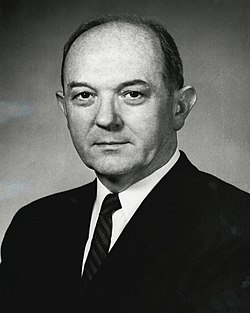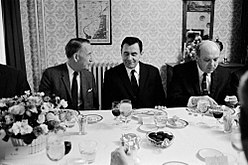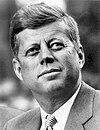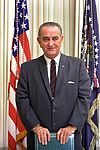Dean Rusk: Difference between revisions
m Reverted edits by 104.34.113.199 (talk) to last version by Fat&Happy |
No edit summary |
||
| Line 34: | Line 34: | ||
|spouse = Virginia Foisie Rusk |
|spouse = Virginia Foisie Rusk |
||
|children = David Rusk<br/>Richard Rusk<br/>Peggy Rusk Smith |
|children = David Rusk<br/>Richard Rusk<br/>Peggy Rusk Smith |
||
|alma_mater = [[Davidson College]]<br/>[[Oxford University]]<br/>[[ |
|alma_mater = [[Davidson College]]<br/>[[Oxford University]]<br/>[[UC Berkeley School of Law]] |
||
|profession = [[Professor]], [[Soldier]], [[Politician]] |
|profession = [[Professor]], [[Soldier]], [[Politician]] |
||
|religion = [[Presbyterian]] |
|religion = [[Presbyterian]] |
||
Revision as of 21:34, 6 June 2014
Dean Rusk | |
|---|---|
 | |
| 54th United States Secretary of State | |
| In office January 21, 1961 – January 20, 1969 | |
| President | John F. Kennedy Lyndon B. Johnson |
| Preceded by | Christian A. Herter |
| Succeeded by | William P. Rogers |
| 2nd Assistant Secretary of State for Far Eastern Affairs | |
| In office March 28, 1950 – December 9, 1951 | |
| President | Harry S. Truman |
| Preceded by | William Walton Butterworth |
| Succeeded by | John Moore Allison |
| 1st Assistant Secretary of State for International Organization Affairs | |
| In office February 8, 1949 – May 26, 1949 | |
| President | Harry S. Truman |
| Preceded by | Post created |
| Succeeded by | John D. Hickerson |
| Personal details | |
| Born | David Dean Rusk February 9, 1909 Cherokee County, Georgia, U.S. |
| Died | December 20, 1994 (aged 85) Athens, Georgia, U.S.[1] |
| Resting place | Oconee Hill Cemetery in Athens, Georgia, U.S. |
| Political party | Democratic |
| Spouse | Virginia Foisie Rusk |
| Children | David Rusk Richard Rusk Peggy Rusk Smith |
| Alma mater | Davidson College Oxford University UC Berkeley School of Law |
| Profession | Professor, Soldier, Politician |
| Awards | Legion of Merit |
| Signature | |
| Military service | |
| Branch/service | United States Army |
| Rank | Colonel |
| Battles/wars | World War II |

David Dean Rusk (February 9, 1909 – December 20, 1994) was the United States Secretary of State from 1961 to 1969 under presidents John F. Kennedy and Lyndon B. Johnson. Rusk is the joint-second-longest serving U.S. Secretary of State of all time, behind only Cordell Hull and tied with William H. Seward.
Childhood and education
Born as David Dean Rusk in the rural district[2] of a Cherokee County, Georgia on February 9, 1909, to the son of Robert Hugh Rusk and the former Frances Elizabeth (née Clotfelter) Rusk.[3] He was educated in Atlanta's public schools, graduated from Boys High School in 1925,[4] and spent two years working for an Atlanta lawyer before working his way through Davidson College. Rusk was coached in football by William "Monk" Younger and was a member of the Kappa Alpha Order Sigma chapter,[5] and the national military honor society Scabbard and Blade becoming a Cadet Lieutenant Colonel commanding the Reserve Officers' Training Corps battalion. He graduated Phi Beta Kappa in 1931.[4] While studying in England as a Rhodes Scholar at St. John's College, Oxford, he received the Cecil Peace Prize in 1933.[4][6]
Rusk married the former Virginia Foisie (October 5, 1915 – February 24, 1996) on June 9, 1937.[4] They had three children: David, Richard and Peggy Rusk.[7]
Rusk taught at Mills College in Oakland, California from 1934 to 1949, and he earned a law degree at the University of California, Berkeley in 1940.
Career prior to 1961
During World War II he joined the infantry as a reserve captain, and served as a staff officer in the China Burma India Theater. At war's end he was a colonel, decorated with the Legion of Merit with Oak Leaf Cluster.[4]
He returned to America to work briefly for the War Department in Washington. He joined the Department of State in February 1945, and worked for the office of United Nations Affairs. In the same year, he suggested splitting Korea into spheres of U.S. and of Soviet influence at the 38th parallel north. He was made Deputy Under Secretary of State in 1949. He was made Assistant Secretary of State for Far Eastern Affairs in 1950 and played an influential part in the US decision to become involved in the Korean War, and also in Japan's postwar compensation for victorious countries, such as the Rusk documents. However he was a cautious diplomat and always sought international support.
Rusk was a Rockefeller Foundation trustee from 1950 to 1961. In 1952 he succeeded Chester L. Barnard as president of the Foundation.[4]
Secretary of State
On December 12, 1960, Democratic President-elect John F. Kennedy nominated Rusk to be Secretary of State. According to historian and former Special Assistant to President Kennedy Arthur Schlesinger, Jr., Rusk was not Kennedy's first choice, but rather the "lowest common denominator", as Kennedy's first choice, J. William Fulbright, proved too controversial.[8] David Halberstam also described Rusk as "everybody's number two".[9] Rusk was sworn in on January 1961.[4]
As Secretary of State he believed in the use of military action to combat communism. Despite private misgivings about the Bay of Pigs invasion, he remained noncommittal during the Executive Council meetings leading up to the attack and never opposed it outright. During the Cuban missile crisis he supported diplomatic efforts. A careful review by Sheldon Stern, Head of the JFK Library, of Kennedy's audio recordings of the EXCOMM meetings suggests that Rusk's contributions to the discussions probably averted a nuclear war.[10] Early in his tenure, he had strong doubts about US intervention in Vietnam,[11] but later his vigorous public defense of US actions in the Vietnam War made him a frequent target of anti-war protests. Outside of his work against communism, he continued his Rockefeller Foundation ideas of aid to developing nations and also supported low tariffs to encourage world trade. Rusk also drew the ire of supporters of Israel after he let it be known that he believed the USS Liberty incident was a deliberate attack on the ship, rather than an accident.

As he recalled in his autobiography, As I Saw It, Rusk did not have a good relationship with President Kennedy. The president was often irritated by Rusk's reticence in advisory sessions and felt that the State Department was "like a bowl of jelly" and that it "never comes up with any new ideas". Special Consul to the President Ted Sorensen believed that Kennedy, being well versed and practiced in foreign affairs, acted as his own Secretary of State. Sorensen also said that the president often expressed impatience with Rusk and felt him under-prepared for emergency meetings and crises.[12] Rusk repeatedly offered his resignation, but it was never accepted. Rumors of Rusk's dismissal leading up to the 1964 election abounded prior to President Kennedy's trip to Dallas in 1963. Shortly after Kennedy was assassinated, Rusk offered his resignation to the new president, Lyndon B. Johnson. However, Johnson refused Rusk's resignation and retained him as the Secretary of State throughout his administration.
When Johnson died in 1973, Rusk eulogized the former President when he lay in state.
After President of France Charles de Gaulle withdrew France from the common NATO military command in February 1966 and ordered all American military forces to leave France, President Johnson asked Rusk to seek further clarification from President de Gaulle by asking whether the bodies of buried American soldiers must leave France as well.[13] Rusk recorded in his autobiography that de Gaulle did not respond when asked, "Does your order include the bodies of American soldiers in France's cemeteries?"[14][15]
Rusk offered or planned to offer to resign in the summer of 1967, because "his daughter planned to marry a black classmate at Stanford University, and he could not impose such a political burden on the president"[16] after it became known that his daughter, Peggy, planned to marry Guy Smith,[17] "a black Georgetown grad working at NASA. (Johnson didn't accept it.)"[18] In fact, the Richmond News Leader stated that it found the wedding offensive, further saying that "anything which diminishes [Rusk's] personal acceptability is an affair of state".[1] He decided not to resign after talking first to Robert S. McNamara and Lyndon Johnson.[19]
A year after his daughter's wedding, Rusk was invited to join the faculty of the University of Georgia Law School, only to have his appointment denounced by Roy Harris, an ally of Alabama Governor George Wallace and a member of the university's board of regents, who stated that his opposition was because of Peggy Rusk's interracial marriage. The university nonetheless appointed Rusk to the position.[17]
Retirement
Rusk received both the Sylvanus Thayer Award and the Presidential Medal of Freedom in 1969.
Following his retirement, he taught international law at the University of Georgia School of Law in Athens, Georgia (1970–1984). Rusk died of heart failure in Athens, Georgia on December 20, 1994, at the age of 85. He and his wife are buried at the Oconee Hill Cemetery in Athens-Clarke County, Georgia.
Rusk Eating House, the first women’s eating house at Davidson College, was founded in 1977 and is named in his honor. The Dean Rusk International Studies Program at Davidson College is also named in his honor.
Dean Rusk Middle School, located in Canton, Georgia, was named in his honor, as was Dean Rusk Hall on the campus of the University of Georgia.
Bibliography
- Rusk, Dean (1963). The winds of freedom; selections from the speeches and statements of Secretary of State Dean Rusk, January 1961- August 1962. Boston: Beacon Press. OCLC 1106835.
{{cite book}}:|access-date=requires|url=(help) - Rusk, Dean (1990). Rusk, Richard; Papp, Daniel S. (eds.). As I Saw It. New York: W. W. Norton & Company. ISBN 0-393-02650-7.
See also
References
- ^ New York Times,Dec 22, 1994,pg. A1
- ^ MORRISON, DONALD (1990-07-30). "Ghost Dad (bk rvw of AS I SAW IT by Dean Rusk, as told to Richard Rusk)". Time. Retrieved 2008-02-04.
I won't be around for history's verdict," says Rusk, now 81 and ailing in his Georgia retirement, "and I am perfectly relaxed about it.
- ^ Page 425 of Congressional Directory,89th Congress, Second Session, January 1966
- ^ a b c d e f g Anonymous. "Biography of Dean Rusk". Davidson College. Retrieved 2008-02-03.
- ^ "Famed Fraternity Members". Kappa Alpha Order. Retrieved 2008-02-03.
- ^ Turner, Arthur Campbell (2005-04-05). "Transcription of Oral History Audio Interview with ARTHUR CAMPBELL TURNER April 6 and May 28, 1998" (PDF). University of California, Riverside. p. 8. Retrieved 2008-02-03.
{{cite web}}: Unknown parameter|coauthors=ignored (|author=suggested) (help) - ^ "Parks Rusk Collection of Dean Rusk Papers". Richard B. Russell Library for Political Research and Studies. University of Georgia. pp. Biographical Note. Retrieved 2008-02-04. [dead link]
- ^ Schlesinger, Jr., Arthur M. (2008). Journals 1952-2000. Penguin Books. p. 98. ISBN 978-0-14-311435-2.
Elizabeth Farmer told me this evening that, at five this afternoon, it looked as if it would be Rusk in State, with Bowles and Bundy as Undersecretaries. (Ken, by the way, told me that Jack had called him on the 7th and talked seriously about Mac as Secretary.) I asked why Rusk had finally emerged. Elizabeth said, 'He was the lowest common denominator.' Apparently Harris Wofford succeeded in stirring the Negroes and Jews up so effectively that the uproar killed Fulbright, who was apparently Jack's first choice.
- ^ Halberstam, David (1972). The Best and the Brightest. Random House. p. 32. ISBN 0-394-46163-0.
- ^ Averting the Final Failure: John F. Kennedy and the Secret Cuban Missile Crisis Meetings, by Sheldon M. Stern, Stanford University Press, 2003, p. 80.
- ^ Henry II, John B.; William Espinosa (Autumn 1972). "The Tragedy of Dean Rusk" (fee). Foreign Policy (8). Carnegie Endowment for International Peace: 166–189. doi:10.2307/1147824. Retrieved 2008-02-04.
- ^ Sorensen, Ted (2008). Counselor: A Life At The Edge Of History. HarperCollins. pp. 233–234. ISBN 978-0-06-079871-0.
President Kennedy was less satisfied with his secretary of state, Dean Rusk...John F. Kennedy, more than any president since FDR, was his own secretary of state...But it was not the White House staff that said the State Department was 'like a bowl of jelly', or that it 'never comes up with any new ideas'. Those were John F. Kennedy's words...More than one White House tape revealed the president's impatience with Rusk...nor did JFK or RFK believe that Rusk himself was as thoroughly prepared for emergency meetings and crises as he should have been.
- ^ Ogden, Christopher (1995-09-18). "Bombs Away!". Time. Vol. 146, no. 12. pp. 166–189. Retrieved 2009-02-11.
- ^ "Andrew Roberts addresses The Bruges Group". The Bruges Group. Retrieved 2009-02-11.
- ^ Schoenbaum, Thomas J. (1988). Waging Peace and War: Dean Rusk in the Truman, Kennedy, and Johnson Years. Ann Arbor, Michigan: Simon and Schuster. p. 421. ISBN 0-671-60351-5.
{{cite book}}:|access-date=requires|url=(help) - ^ In Retrospect, Robert McNamara, pg. 282
- ^ a b Romano, Renée Christine (2003). Race Mixing. Harvard University Press. pp. 204–205.
- ^ Rick, Frank (November 2, 2006). "Guess Who's Coming to Dinner". The New York Times. p. W-10.
- ^ McNamara, Robert S. (1995). In Retrospect: The Tragedy and Lessons of Vietnam. Random House. p. 282. ISBN 0-8129-2523-8.
It may be hard for readers today to understand what went through his mind. But it was very clear to me at the time: he believed that because he was a southerner, working for a southern president, such a marriage – if he did not resign or stop it – would bring down immense criticism on both him and the president. .... [T]he president reacted as I expected – with congratulations for the impending marriage. So far as I was aware, the marriage had absolutely no effect – political or personal – on Dean or the president.
External links
- Interview for WGBH series, War and Peace in the Nuclear Age
- "Dean Rusk". Find a Grave. Retrieved 2008-02-05.
- Oral History Interviews with Dean Rusk, from the Lyndon Baines Johnson Library
- A film clip "Longines Chronoscope with Dean Rusk" is available for viewing at the Internet Archive
- A film clip "Longines Chronoscope with Dean Rusk (November 30, 1951)" is available for viewing at the Internet Archive
- Sully, François, "Dean Rusk with General Khanh, Harkins and Wheeler and Lodge touring Vietnamese highlands." (photo/caption), April 1964; copyright Healey Library, UMass Boston; via openvault.wgbh.org.
- 1909 births
- 1994 deaths
- People from Cherokee County, Georgia
- American Presbyterians
- Georgia (U.S. state) Democrats
- Georgia (U.S. state) lawyers
- United States Secretaries of State
- American people of the Vietnam War
- American legal scholars
- United States Army officers
- American military personnel of World War II
- Davidson Wildcats men's basketball players
- University of California, Berkeley School of Law alumni
- University of Georgia faculty
- American Rhodes Scholars
- Presidential Medal of Freedom recipients
- Recipients of the Legion of Merit
- Rockefeller Foundation
- Lyndon B. Johnson Administration cabinet members
- Kennedy Administration cabinet members
- Honorary Knights Commander of the Order of the British Empire
- Alumni of St John's College, Oxford




